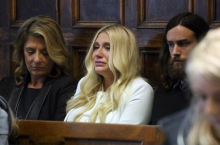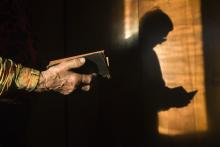Sexual Abuse

The conversation — tagged #KissShameBye and hosted by the No Shame Movement — explored purity culture and its impacts on sex, dating, and marriage. Participants discussed one “source text” for purity culture in particular — I Kissed Dating Goodbye, a hugely popular book among young evangelicals, published 20 years ago, that advocates against dating before marriage and underscores themes of purity, defilement, saving oneself for marriage, and losing one's self-worth if engaged in anything other than hetero marital physical contact.

Mounting accusations of sexual abuse against the archbishop of Guam have prompted Pope Francis to name a Vatican official to oversee the Catholic Church on the Pacific island territory while the charges are investigated.
The decision announced June 6 to force Archbishop Anthony Sablan Apuron, who has led the Agana Archdiocese for 30 years, to yield his authority, at least temporarily, is the latest sign that Francis is taking tougher steps to tackle the sexual abuse crisis.

These accusations suggest evidence of a coverup on the part of the Seattle Archdiocese, wrote KIRO7 reporter Dave Wagner, who first broke the story on his Facebook page.
But "the Seattle Archdiocese maintains it is trying to atone for the sins of the past."

The Association of Baptists for World Evangelism has released a 280-page report revealing how its leaders failed to stop a leading missionary surgeon from sexually abusing 22 women and girls.

As with many cases of rape and trauma, the truth of what happened to Kesha may take a long time to emerge. What is shocking and tragic here, in addition to the possibility that a trusted advisor and legal mentor could sexually assault his protégé (and then publicly deny it), is the very apparent commercial, and legal, incentive to keep the career and fortunes of woman in clear distress bound to her alleged abuser.

Early in the film Spotlight, about the Boston Globe investigative reporting team that exposed the decades-long cover-up of sex abuse by Catholic church leaders, a Globe reporter is shown at Mass with her grandmother. The priest, launching his homily, says, “Knowledge is one thing. Faith is another.”
In a simplistic film, this binary statement might set the tone for a black-and-white portrait of journalists as pure heroes and people of faith as solely hypocrites and worse. But Spotlight works with characters not caricatures; not one-dimensional heroes and villains, but real people who sometimes choose expediency and sometimes courage. No one is shown to be flawless, not even the reporters and editors who do great good in bringing to light systemic crimes.
But the movie does illustrate quite clearly one tension between knowledge and faith: The guardians of institutions, including churches, can fear knowledge to the point of pathology.

For me, the question of what to do with Yoder is not only an academic issue but a personal one. I was Yoder’s graduate assistant — and would be his next-to-last — for two years. Academically, how I teach my “War and Peace in the Christian Tradition” course is indebted in great extent to what I learned from him. As evident in numerous footnotes, my scholarship and publications, including for Sojourners, over the last two decades on just war and just policing also owe a lot to both his research and his mentoring.
Nevertheless, after this semester, I am leaning towards Blanton’s recommendation of setting Yoder’s work aside, at least for the foreseeable future. I think it is now possible to rely on the work of others for persuasive defenses of nonviolence and for strong critiques of Niebuhrian realism. I struggled over whether to use one of his books or essays in my course this semester. I hesitated to say anything about Yoder’s misconduct to my students. It took me a while before I did so.
What to do with Yoder? I’m not sure.

Pope Francis began the final day of his U.S. visit by meeting privately with five adults abused as children by clergy, teachers, or family members, telling them they should expect the church to look after them and vowing “the zealous vigilance of the church to protect children and the promise of accountability for all,” including bishops.
“For those who were abused by a member of the clergy, I am deeply sorry for the times when you or your family spoke out, to report the abuse, but you were not heard or believed. Please know that the Holy Father hears and believes you,” he told the three women and two men — who he called “survivors” — at the private meeting at a seminary here on Sept. 27.
A leading victims’ advocacy group in the U.S. quickly dismissed the meeting as another “feel good, do nothing” papal meeting with survivors. This is the second time Francis has met with victims; the first was in the Vatican in July last year.
According to the Vatican’s account of the meeting, Francis expressed “deep regret” that some bishops shielded abusive priests, and added: “I pledge to you that we will follow the path of truth wherever it may lead. Clergy and bishops will be held accountable when they abuse or fail to protect children.”
The pope praised the witness of the victims, who were not identified, and said their presence was “so generously given despite the anger and pain you have experienced.”

Unlike her previous music videos, known for their theatrics and intricate dance numbers, Lady Gaga’s new video “ Til It Happens to You” opens on a simple black and white shot of a college dorm. Like most dorms across the country, the walls are sparse cinderblock, the floors are tiled, and the desk and beds are made of heavily lacquered pinewood.
Like many dorms across the country, this set is the scene of multiple sexual assaults. More than one-in-five women are sexually assaulted or raped on college campuses each year. Lady Gaga’s video was made in conjunction with the documentary film on campus rape, The Hunting Ground, and the stories her video portrays are both unique in their details and disconcertingly familiar.
There are harrowing scenes to watch, but the video does not end on the nights of the assaults. Each survivor has to deal with the trauma in her own way. They pull away from their friends. One fears the bathroom and stops showering. The two friends are unable to talk about what happened and one drops out of school.

Kranti is Hindi for "revolution." Indeed, this extraordinary organization is working to erase the heavy labels that come with being born, raised, and even trafficked in Kamathipura. Laal Batti Express ("Red Light Express") is a three-segment depiction of the girl’s delightful and dark stories, of which each performer was asked to add three.
"We call the girls revolutionaries," Robin said.

My experience in the worlds of both religion and politics convinces me that one of three issues is at the heart of the catastrophic demise of any leader — money, sex, or power. Sometimes it’s a trifecta of all three together, like the case of John Edwards, the former Democratic presidential candidate. But in virtually every case, a leader’s personal inability to exercise appropriate constraint and control over one or more of these three dimensions of life can lead to careers that crumble and reputations that become shattered.
That’s why, despite all the fascination on the external qualities, traits, and strategies of successful leaders, it’s their internal lives that can be far more decisive in their long-term ability to be transformative leaders — or not. But that requires attentiveness to the powerful but often hidden dynamics of one’s interior life, which “successful” leaders rarely have the time or courage to undertake.

More than 55,000 people have signed a petition calling for Cardinal George Pell to return to his native Australia and face a government commission on child sex abuse, after allegations that he tried to bribe the victim of a pedophile priest.
Addressed to Pope Francis, the Change.org petition calls for Pell — the Vatican’s financial chief and former archbishop of Sydney — to answer questions from Australia’s Royal Commission into Institutional Responses to Child Sexual Abuse.

During my freshman year of college, a girl who lived in my dorm was raped. It was during the first month of school. I didn’t know her well. As the rumors spread, I remember thinking, “Oh yeah, the blonde with the big boobs.”
I remember having a conversation with my friend about how nice the accused boy seemed. I remember that friend replying, “She did wear low cut shirts during orientation — makes sense she would start a rumor like that.”
The survivor transferred from my college the following semester.
During my senior year of college, my best friend was the president of his fraternity. During the fall semester, there was a reported case of rape that occurred with two males and one female in the basement during a party. All I remember is how stressed my friend was because, as president, he had to deal with the legal proceedings of the case. The case was closed without either of the men being prosecuted. I remember being upset because my favorite fraternity was put on probation (no parties on the weekend) for two months. I never knew the survivor.
The documentary The Hunting Ground taught me I was part of campus rape culture, and I didn’t even realize it. It is estimated that between 20 percent and 25 percent of women experience completed or attempted rape over the course of a college career. That means for every 1,000 women attending a college or university, there are 35 incidents of rape each academic year.

The term "rape culture" is a sociological theory in which individuals who sexually harass and assault others are given a social license to do so, as they live in a society that makes excuses for perpetrators and blames victims for their own abuse. Feminist theorists often argue that rape culture beliefs are socialized into young men and women from childhood. Young men are socialized into beliefs that they have power and/or control and entitlement over others' bodies from a very young age. Likewise young women are socialized into believing they control men’s desire and lust via their clothing, behavior, and attractiveness. The theory of rape culture argues that these social beliefs facilitate sexual harassment, inappropriate sexual touch, sexual assault, and sexual objectification of others by reducing the stigma of engaging in unwanted sexual behavior and by increasing a since of entitlement from men towards women.
In Christian spheres of influence there has been an increasing focus — via Sojourners, Christians for Biblical Equality, and likeminded groups — to exposing how social beliefs, church leaders, and authoritarian theology has contributed to rape culture beliefs in the church and in the larger community. This focus comes in the midst of a media debate between social conservatives and social progressives about the very existence of rape culture. Inspired by conservative opposition to the recent publicity from the White House on the epidemic of sexual assault on college campuses, this debate was further inflamed by the retraction of a Rolling Stone article about allegations of sexual assault at the University of Virginia. In response, it has become popular in recent months for conservative commentators to argue that there is no such thing as "rape culture."
This escalation of rhetorical debate is dangerous because it distracts from the real concern that rape culture theory was developed to address — that we help socialize dangerous behavior in children by our actions, inactions, and modeled beliefs.

The fact that the journalistic “scandal” got more public attention than the original story should give us pause. And the narrative that is playing out in the story’s wake — the one that says the college campus rape crisis is nothing more than a hoax perpetrated by the left — is disturbing.

Rolling Stone is not the only one throwing sexual abuse victims under the bus these days. An alarming report released today reveals that Bob Jones University, a historically fundamentalist Christian college, failed to support nearly 40 victims of sexual abuse over four decades.
In January 2013, Bob Jones University hired GRACE (Godly Response to Abuse in the Christian Environment) to conduct an independent investigation of the college’s response to sexual abuse allegations.
The report states that BJU officials were not adequately prepared or trained to counsel victims appropriately, often treating victims as blameworthy for their abuse or sexual assault experienced during childhood or adulthood.
In a video statement recorded yesterday, BJU President Steve Pettit issued an apology to students and faculty:
On behalf of Bob Jones University, I would like to sincerely and humbly apologize to those who felt they did not receive from us genuine love, compassion, understanding, and support after suffering sexual abuse or assault. We did not live up to their expectations. We failed to uphold and honor our own core values. We are deeply saddened to hear that we added to their pain and suffering.

Following up on remarks to “60 Minutes” about the clergy sex abuse crisis and other controversial topics, Boston Cardinal Sean O’Malley has stressed that the Catholic Church needs a system to hold bishops accountable and must “avoid crowd-based condemnations.”
“We are all aware that Catholics want their leaders to be held accountable for the safety of children, but the accountability has been sporadic,” O’Malley wrote in a column posted Nov. 19 at the website of the archdiocesan newspaper. “We need clear protocols that will replace the improvisation and inertia that has often been the response in these matters.”
“Bishops also deserve due process that allows them to have an opportunity for a fair hearing,” he added.
O’Malley’s column was responding to both praise and criticism of his CBS interview broadcast Nov. 16 in which he said the Vatican needs to respond “urgently” to cases like that of Missouri Bishop Robert Finn, who remains in office despite a conviction in 2012 for failure to report concerns about a priest, the Rev. Shawn Ratigan, who was later convicted of federal child pornography charges.
The cardinal said Francis, who recently sent a Canadian archbishop to Finn’s diocese to investigate, was personally aware of the situation.
In the “60 Minutes” interview, O’Malley also called the Vatican’s investigation of American nuns a “disaster” and said if he were starting a church “I’d love to have women priests,” but he added that’s not what Jesus did. Both comments sparked strong reactions.

Anglican priests should no longer be bound by the centuries-old principle of confidentiality in confessions when they are told of sexual crimes committed against children, the Church of England’s No. 2 official said.
Speaking at the end of an internal inquiry on whether senior church officials ignored abuse allegations involving children, Archbishop of York John Sentamu said that “what happened was shameful, terrible, bad, bad, bad.”
He said that the Church of England must break the confidentiality of confession in cases where people disclosed the abuse of children. “If someone tells you a child has been abused, the confession doesn’t seem to me a cloak for hiding that business. How can you hear a confession about somebody abusing a child and the matter must be sealed up and you mustn’t talk about it?”

This week, the Baltimore Ravens terminated the contract of star runningback Ray Rice after video of Rice beating his then-fiancée Janay emerged online. Rice had previously been suspended for two games for the assault. With the release of the video, media scrutiny swiftly turned to his now-wife, speculating over why she would marry her abuser.
Beverly Gooden, a human resources manager and blogger, had a different response. Herself a survivor of domestic abuse, Gooden began tweeting of her own experiences, each one a vulnerable explanation: #WhyIStayed.
Gooden wrote, “I can't speak for Janay Rice, but I can speak for Beverly Gooden. Why did I stay? … Leaving was a process, not an event. And sometimes it takes awhile to navigate through the process. ...I hope those tweeting using #WhyIStayed find a voice, find love, find compassion, and find hope.”
We would all do well to listen. Some of the most powerful tweets below.

When I was a university student, more and more people were getting cell phones that had cameras — a trend I only noticed when signs in the women’s locker room went up, warning that using cell phones in that space was strictly prohibited for reasons of privacy. It’s alarmingly easy to take pictures of someone without their knowing. You can pretend to be writing a text message when, in fact, you’re capturing someone’s image and then posting it on the Internet for anyone to see.
That’s bad manners, of course, if we’re talking about simply posting unflattering photos — and even more morally and ethically questionable if the subjects are in a partial or total state of undress. But even when a person consents to be photographed nude, if those private images end up on the Internet — as roughly 200 such celebrity photographs did last weekend — it can be surprisingly difficult to get them removed.
4Chan, the anonymous message boards where the images first appeared, and Reddit, where they were posted and shared widely, are able to claim that Section 230 of the Communications Decency Act of 1996 allows them to deny responsibility for the content that’s posted to their site by individual users. They certainly have the capability to remove such images, but they don’t want to — and the law doesn’t compel them to.
As Emily Bazelon noted in Slate, Reddit moved quickly to delete nude photographs of Olympic gymnast McKayla Maroney taken while she was underage.
“It’s not that Reddit is too shady to care about the law,” Bazelon writes. “It’s that there is no clear legal risk in continuing to host involuntary porn of adults.”